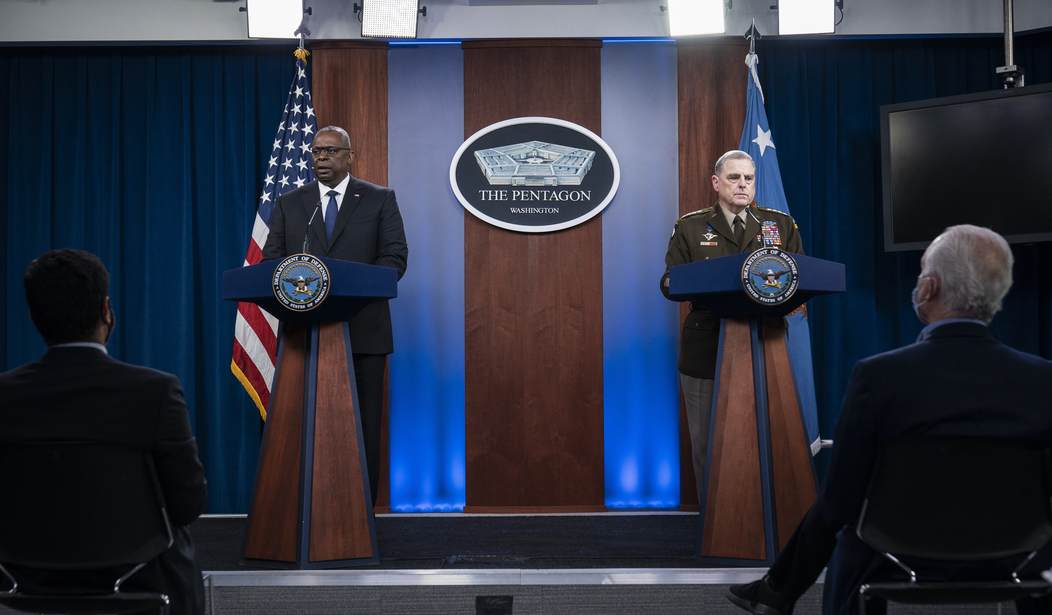In a Senate hearing this week, President Biden's top military brass admitted, somewhat inadvertently, that the White House's plan to share intelligence on Russia with China — in an attempt to have the genocidal government dissuade Putin from invading Ukraine — was a mistake. As with most half-hearted admissions of the sort from the Biden administration, this one is too little, too late.
As Townhall reported at the time, it was revealed by The New York Times in late February that President Biden wasted months in the lead up to Putin's invasion of Ukraine trying to work with the Chinese Communist Party to have them convince the Russian government to abandon their plans to seize Ukraine by force.
The Biden-China conversations included the sharing of U.S. intelligence with China, including intel on Russian troop movement, but Chinese officials rebuffed Biden's pleas for help getting through to Putin. At the same time, China shared the American intelligence reports with Russia, which showed Putin what the U.S. knew and where potential blind spots may be.
Secretary of Defense Lloyd Austin and Chairman of the Joint Chiefs Mark Milley were asked about Biden's decision to share such information with China over a period of some three months that proved ultimately unsuccessful in convincing China to help or Russia to withdraw from Ukraine's border.
"Why don't we make our intelligence reports public?" Senator Marsha Blackburn (R-TN) asked Secretary Austin on Thursday.
"We share as much as we can from our intel reports," Austin responded, "but as you know we have to be careful about protecting sources and methods so that we don't lose capability."
Recommended
"And would you agree that giving our adversaries access to our intel reports is a poor decision?" Blackburn asked.
"Exactly," Austin said. "I think that's something that we absolutely work to avoid," despite the fact that such access to American intelligence was given to China and then provided to Russia.
"Why did senior Biden officials hold nearly half a dozen meetings with top Chinese officials to give them information on Russian troop movements?" Blackburn then asked.
Austin denied knowing about the months of conversations between the Biden administration and China or how U.S. intelligence made its way to Russian officials: "I don't know," he replied. "I don't have insights on any occurrences like that," despite the fact that The New York Times reported on the situation in February.
"I would imagine you do not support giving Russia our intelligence?" Blackburn pressed Austin.
"I am unfamiliar with the issue that you raise, but you are right," the Defense Secretary conceded, showing a divide between what Biden's military leaders and others in his administration believe to be wise foreign policy.
Turning to Mark Milley, Blackburn asked the Chairman of the Joint Chiefs of Staff "under what circumstances, if any, have you advised intelligence sharing with Beijing?"
"Zero. Never," Milley responded.
"What would you advise for similar scenarios going forward?" Blackburn asked as a followup.
"I don't think you should give intelligence to our adversary — period," Milley said in another inconsistency between the Pentagon's advice and the White House's actions. Milley, too, denied knowledge of the reports or the meetings that took place between U.S. and Chinese officials that allowed U.S. intelligence to fall into the hands of two of countries hostile to our own.
Watch the exchange below:
Top Biden defense officials just admitted that it was wrong of the administration to share intelligence about Russia with the Chinese.
— Sen. Marsha Blackburn (@MarshaBlackburn) April 7, 2022
You’d think they would have figured that out ahead of time. pic.twitter.com/8beja9D75Z
























Join the conversation as a VIP Member